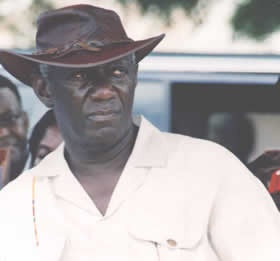
Does the media make it appear as if the Establishment or the Presidency of Kufour has done nothing or maybe the public relations (PR) of the Establishment is taking the people of Ghana for granted? The media, for instance, has been telling us so much of the many travels of President Kufour without mentioning any or little of the positive outcomes of Kufour’s presidency except for his per-diem allowances. I think this is not fair on Kufour’s administration. But I might be quick to blame it on the President’s PR (spokes person) or lack of political propaganda.
Some of us may be so critical on the government not because we love to do so but we do so based on the on the information available. Usually the secrecy of our government makes the work of the media as well as political analyst very difficult. Lack of information leads to rumors-mongering as there remains some shroud of secrecy over public material information in African politics.
A careful look into the economy of Ghana today (September 2006) may reveal that President Kufour’s NPP is not doing all that poorly as it may appear to most of us and that the Establishment is not all that evil although I must admit there are many selfish ones among them.
One wonders why the Kufour-NPP has been unsuccessful in winning the appreciation of the masses if the 2006 IMF report is a true picture of Ghana’s economy today. Then the PR for President Kufour has not been good enough or effective enough to dissipate the anger and frustrations of the people against the presidency. Unlike the NDC regime of President Rawlings, the NPP regime of President Kufour has been too quiet on its accomplishments. For instance a review of the 2006 IMF report, (Press Release No. 06/190), issued on September 5, 2006 - (portions herein cited) show some significant growth in the economy of Ghana since NPP assumed office. I was hoping to read it or hear more of it from the President’s office but no one has seen the importance of drumming it in the minds of the electorate. If NPP wants to be appreciated it cannot choose to be quiet.
4. Increased public spending on education and health, together with better management has led to:
(i) an increase in the net enrollment ratio in primary education from 60.7 percent in 2000 to 65 percent in 2005;
(ii) improvement in the ratio of girls to boys in primary education from 0.93 in 2000 to 0.96 in 2005; and
(iii) stabilization in infant and under-5 child mortality rates.
According to the report, by 2005, 75 percent of the total population in Ghana had access to improved water sources. All of these are important achievements in the context of a challenging environment that required steadfastness in the pursuit of difficult economic reforms. In assessing performance under the PRGF-supported program all but one of the quantitative performance criteria was met- the ceiling on the net domestic assets of the Bank of Ghana for end-June 2006 was exceeded for technical reasons. This, according to the Mission indicates progress in implementing structural reforms, with the structural performance target being observed. Therefore, the mission recommends to the IMF management that the seventh installment under the PRGF arrangement of about US$17.7 million be disbursed as scheduled in October 2006 (Press Release No. 06/190; September 5, 2006). It must also be noted that the interest rate on 91-day treasury bills, a key reference rate for the money market fell from 42½ percent at the end of 1997 to 33½ percent at end-July 1998. The real interest rate on the 91-day treasury bill rates also declined from 18 percent at the end of 1997 to 10 percent at end-September 1998.
5. Ghana's macro-economic performance has in 2006 received international recognition. According to Business News of Wednesday September 6, 2006, Ghana is ranked within the first 10 business performers in the world today. The Report released on September 1, 2006 by World Bank/International Finance Corporation (IFC) ranking placed Ghana at the ninth position out of a total of 175 countries. Tanzania was the only other African country that joined the league of the top 10, coming after Ghana. The criteria for selection included among other things access to credit, property registration, interest rate and taxes(www.ghanaweb.com).
6. The latest data on Human Poverty Index, according to the same IFC report, shows that poverty in the country has declined from 51.7 per cent in 1998/99 to 41.0 per cent in 2002/2003(As cited in GNA).
Another news that the PR of the incumbent NPP administration has not been marketing or advertising would be Kufour’s pledge to compensate the victims of atrocities meted out by agents of the Rawlings regime- capital equipment, plots of land, a fleet of vehicles, bank accounts, physical cash in both local and foreign currencies, gold bars, household valuables and many others- that were seized ILLEGALLY.
If all these are true, is it not obvious that the public relations of the President is poorly disseminating some pertinent information?